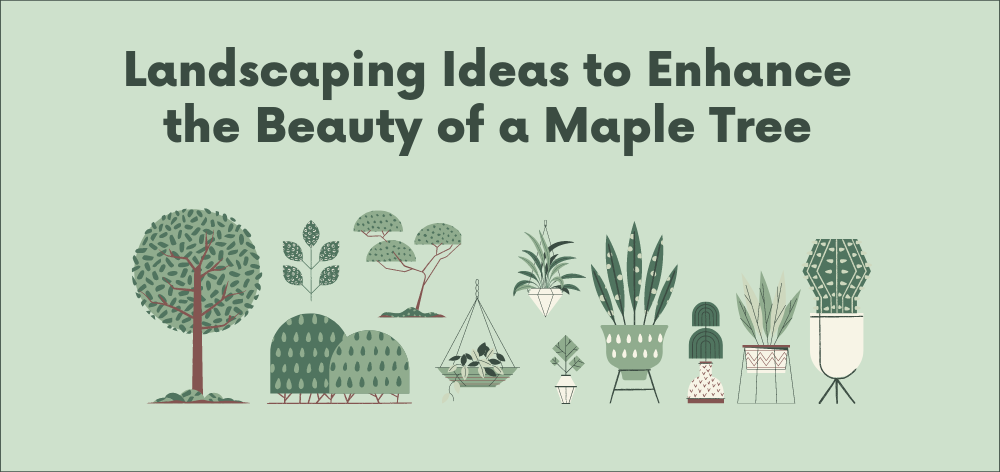
Everything You Need to Know About Landscaping Under Maple Trees
A large maple tree can be a stunning centerpiece in any garden. Its vibrant colors and graceful presence make it a perfect focal point. But how can you enhance its beauty even further? In this blog post, we will explore some landscaping ideas based on factual data that will help you make the most of your maple tree. From companion plants to accent features, we’ve got you covered. So, let’s dive in and discover how.
Looking for some landscaping ideas to spruce up the area under your maple tree? Here are the top 5 landscaping ideas to get you started:
- install a small stone or gravel path leading up to the tree. This will create a neat look, making it easy to access the tree for trimming and other maintenance.
- Plant some low-growing shrubs or ground cover around the tree’s base. This will help to fill in any bare spots and give the area a more finished appearance.
- Add a few decorative touches, such as a birdbath or statue. These elements can help to bring your landscape design together and make it look complete.
- Install a pathway leading up to the tree for easy access. This not only adds functionality but also adds visual appeal to the overall design. Consider using materials such as gravel, stepping stones, or mulch to create a pathway that blends seamlessly with the surroundings.
- Incorporate some strategic lighting to highlight the tree and create a warm ambiance in the evenings. Solar-powered lights can be a great option, as they are eco-friendly and require minimal maintenance.
Tree Ring Design
Enhancing the beauty of a maple tree goes beyond just its majestic presence. Adding a well-designed tree ring can transform your outdoor space into a stunning garden. Here are some landscaping ideas to consider:
Creating a tree ring around the maple tree
One way to enhance the beauty of a maple tree is by creating a decorative tree ring around its base. This adds visual interest and helps protect the tree’s roots. You can create the ring with various materials such as stones, bricks, or even decorative mulch. Be sure to measure the right diameter and thickness for the most aesthetically pleasing result.
Selection of plants and flowers for the tree ring
Once you have your tree ring in place, it’s time to select the right plants and flowers to complement your maple tree. Consider choosing plants that have contrasting colors and textures to create an eye-catching display. Low-growing ground cover plants like creeping thyme or vinca can beautifully fill in the space, while colorful flowers like impatiens or begonias can provide bursts of vibrant hues. Don’t forget to consider the amount of sunlight and water requirements of the plants you choose.
In summary, creating a well-designed tree ring and carefully selecting plants and flowers can truly enhance the beauty of your maple tree. Remember that landscaping is an art, so let your creativity shine and enjoy the stunning result!
Mulching Techniques
Benefits of mulching around a maple tree
- Retains soil moisture and prevents evaporation
- Suppresses weed growth and competition for nutrients
- Insulates the soil, protecting roots from extreme temperatures
- Improves soil fertility as the organic mulch breaks down over time
- Enhances the aesthetic appeal of the tree by creating a neat and tidy appearance
Choosing the right mulch material
When it comes to choosing the best mulch for your maple tree, there are various options to consider:
- Wood Chips:Provides excellent moisture retention and gradually adds nutrients to the soil as they break down.
- Shredded Bark:Offers good insulation properties, preventing soil erosion and protecting roots from temperature fluctuations.
- Grass Clippings:Can be used as a temporary mulch, but should be applied in a thin layer to prevent matting and moisture accumulation.
- Straw:Ideal for preventing weed growth, but may require frequent replacement due to decomposition.
- Rubber Mulch:An environmentally friendly option that enhances water conservation and suppresses weed growth.
Remember to apply mulch around the base of the maple tree, creating a layer that is approximately 2-4 inches thick. Be careful not to pile the mulch against the trunk, leading to moisture buildup and potential rotting.
Using these mulching techniques and selecting the right mulch material for your maple tree will enhance its beauty and promote its overall health and longevity. Enjoy the captivating beauty of your maple tree while also providing it with essential care!
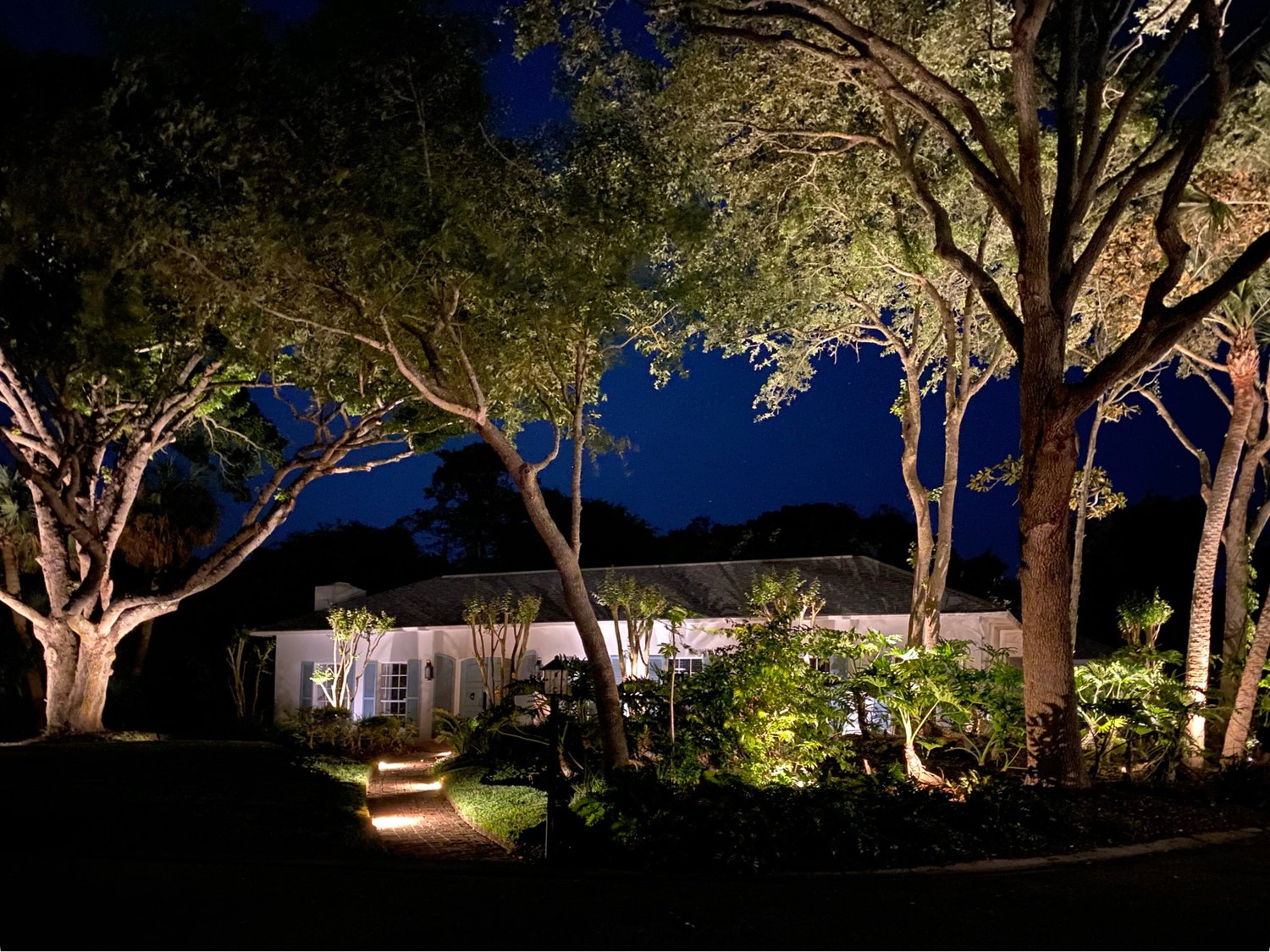
Accent Lighting
Adding accent lights to highlight the maple tree at night
If you have a beautiful maple tree in your yard, why not enhance its beauty by adding accent lighting? Not only will it showcase the tree’s natural features, but it will also create a stunning visual display in your outdoor space. Here are some ideas to get you started:
- Spotlights:Use spotlights to focus on specific areas of the maple tree, such as its branches or leaves. This will create a dramatic effect and draw attention to the tree’s unique characteristics.
- Uplights:Uplights are placed at the tree’s base and shine light upward, illuminating the entire canopy. This technique creates a magical ambiance and highlights the tree’s overall shape and structure.
- String lights:Wrap string lights around the maple tree’s branches for a cozy and enchanting atmosphere. Choose warm white or soft amber bulbs to give your outdoor space a romantic glow.
- Solar-powered lights:Consider using solar-powered lights to highlight your maple tree. These lights are eco-friendly and easy to install, as they don’t require any wiring. They will automatically charge during the day and illuminate your tree at night.
- Color-changing lights:Opt for color-changing lights for a fun and vibrant look. These lights can be programmed to cycle through different colors, creating a mesmerizing display that will surely impress your guests.
By adding accent lighting to your maple tree, you can transform your outdoor space into a captivating oasis that will envy the neighborhood. So go ahead and start experimenting with different types of lighting fixtures to enhance the beauty of your beloved maple tree.
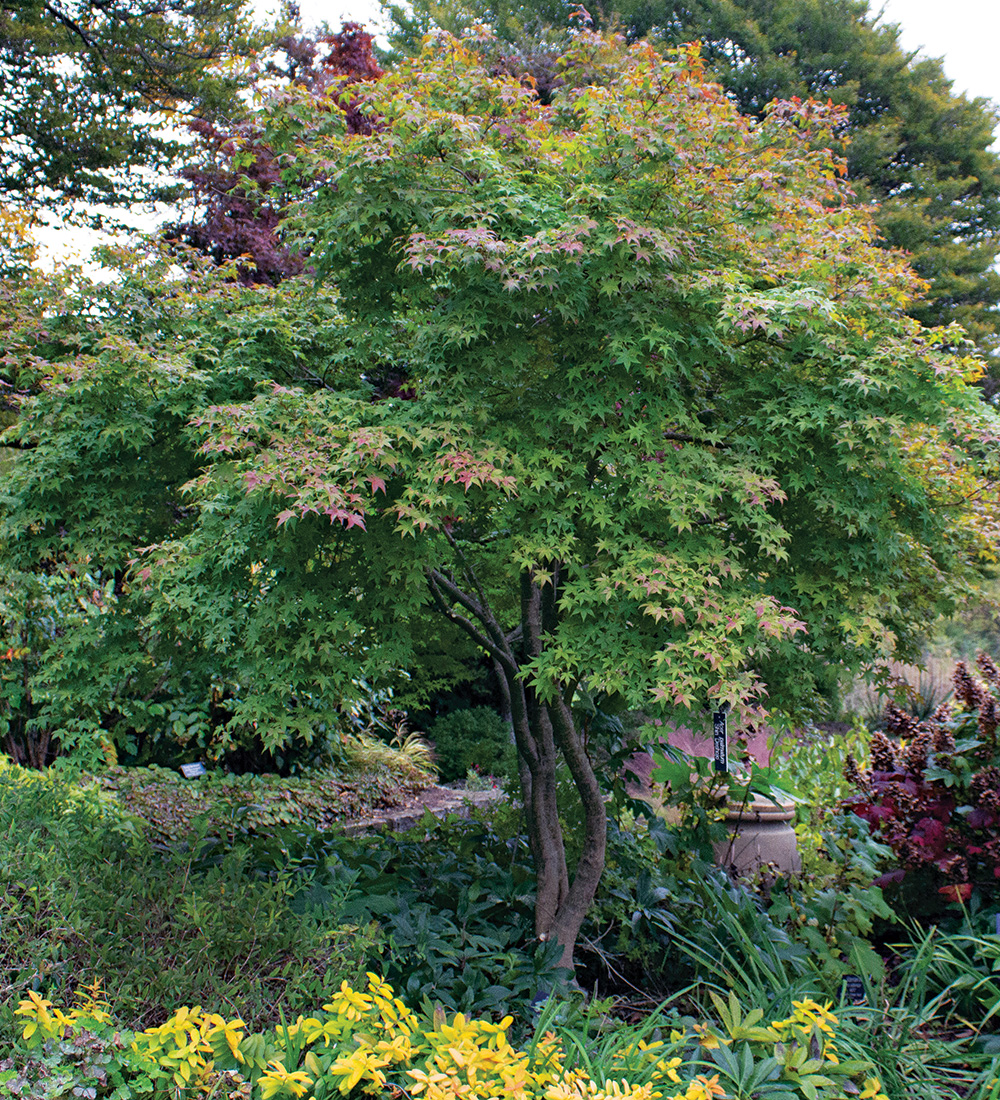
Pruning and Trimming
Every homeowner with a maple tree wants it to be the crowning glory of their yard. To enhance the beauty of your maple tree, here are five landscaping ideas that will make it stand out.
Proper pruning and trimming techniques for a maple tree
1. Mindful pruning:Pruning is essential to maintain the health and shape of your maple tree. When pruning, be careful not to remove too many branches, as this can harm the tree. Instead, focus on removing dead or damaged branches and maintaining a balanced canopy.
2. Timing is key:Maple trees should be pruned during their dormant season, which is usually in late winter or early spring. Pruning during this time helps promote healthy growth and minimizes stress on the tree.
Maintaining the shape and health of the tree
3. Crown thinning:To allow more light and air to penetrate through the canopy, consider crown thinning. This involves selectively removing some interior branches to create a balanced and aesthetically pleasing shape.
4. Crown raising:If your maple tree has lower branches that obstruct walkways or obstruct views, crown raising can help. It involves removing the lower branches to raise the canopy and create more space underneath the tree.
5. Regular maintenance:Keep your maple tree looking its best by regularly inspecting for signs of disease or pests. Proper fertilization and watering will also contribute to its overall health and beauty.
Remember to consult with a professional arborist if you’re unsure about pruning techniques or need assistance with maintaining your maple tree’s beauty. With these landscaping ideas, your maple tree will be the envy of the neighborhood!
Installing a Bench or Seating Area
A maple tree is not only a beautiful addition to your yard, but it can also provide a shady spot to enjoy the outdoors. To enhance the beauty of your maple tree, consider creating a cozy seating area nearby.
Creating a cozy seating area near the maple tree
- Location: Choose a spot that offers a good view of the maple tree. This could be under the tree’s canopy or in an area that allows for a clear line of sight to admire its beauty.
- Benches or Chairs: Select comfortable outdoor furniture that complements the natural surroundings. Opt for materials that can withstand outdoor conditions and consider adding cushions for comfort.
- Accessories: Enhance the coziness factor by including outdoor rugs, throw pillows, and blankets. Choose colors and patterns that complement the colors of the maple tree, creating a cohesive look.
- Lighting: Install fairy lights or lanterns around the seating area to create a magical ambiance at night. This will not only make the space inviting, but it will also highlight the beauty of the maple tree after dark.
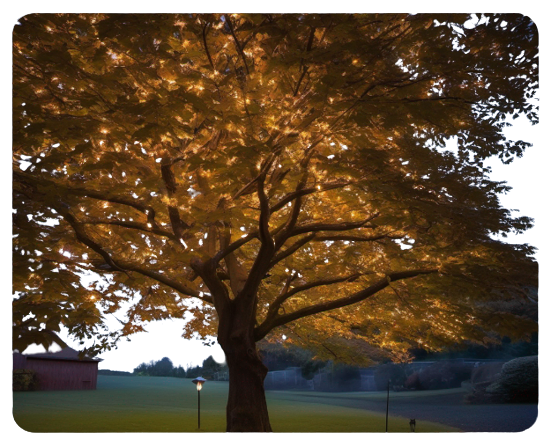
Choosing the right furniture and accessories
- Weather-resistant materials: Look for furniture made from materials like teak, wrought iron, or aluminum that can withstand outdoor conditions and require minimal maintenance.
- Comfortable seating: Opt for cushioned chairs or benches with ergonomic designs to ensure maximum comfort while enjoying your maple tree.
- Matching colors: Choose furniture and accessories that complement the colors of your maple tree. Look for earthy tones or vibrant colors depending on your preferred aesthetic.
- Functional accessories: Consider adding practical accessories like side tables or a small coffee table for convenience when relaxing in your seating area.
By following these landscaping ideas, you can create a beautiful and comfortable seating area that enhances the beauty of your maple tree and provides a cozy spot to enjoy your outdoor space.

Using Natural Stone or Pavers
When it comes to landscaping around a maple tree, incorporating natural stone or pavers can greatly enhance its beauty. Here are a few ideas to consider:
Enhancing the landscape with natural stone or paver walkways or patio around the maple tree
Creating a walkway or patio around your maple tree not only adds functionality but also enhances its aesthetic appeal. Natural stone or pavers can create a beautiful and durable pathway that complements the tree’s natural surroundings. Whether you choose to create a winding path or a circular patio, it will provide a focal point in your landscape design.
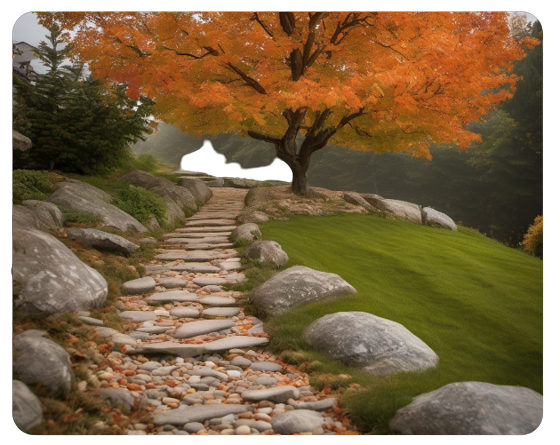
Selection of stone types and patterns
When selecting stones, be sure to choose ones that complement the colors and textures of the maple tree. Consider stones with shades of red, brown, or gray to create a harmonious and cohesive look. You can also play with different patterns like herringbone, basket weave, or random shapes to add visual interest.
Remember to keep the size of the stone or paver in mind when placing them around the maple tree. Larger stones can create a sense of grandeur, while smaller ones can provide a more delicate and intricate look.
By incorporating natural stone or pavers into your landscaping design around a maple tree, you can create a stunning and inviting outdoor space that enhances the beauty of both the tree and your property. So go ahead and get creative with these ideas to transform your outdoor space into a sight to behold.
What Grows Under Maple Trees?
You might not think it, but a number of things can grow well under a maple tree. This is because the maple tree provides good shade and protection from the wind. Some of the best plants to grow under a maple tree include:
Hostas: Hostas are Shade-tolerant perennials that come in a variety of colors and sizes. They make great ground cover and add interest to any garden. Ferns: Ferns also do well in shady areas.
Ferns: Ferns are classic companions for maples, and they come in many different varieties to suit your needs. They prefer moist, shady conditions, making them perfect for growing beneath your maple tree.
Bleeding Heart: These plants provide a splash of color with their delicate pink flowers, adding brightness to your planting bed from spring through summer.
Creeping Phlox: Creeping phlox is a ground cover that helps keep the soil moist and cool, making it an excellent choice for planting under maple trees.
Sweet Woodruff: This plant is another great ground cover option that thrives in shady conditions and complements the maple tree’s surroundings.
There are many different types of ferns available, so you’re sure to find one that suits your taste. Impatiens: Impatiens are another Shade-tolerant plant that comes in many colors. They’re perfect for adding a splash of color to any garden.
Enchanting Landscaping Ideas for Maple Trees with Lush Green Foliage
Maple trees, with their majestic presence and stunning green foliage, are the showstoppers of any landscape. To enhance the beauty of these nature’s architects, we present landscaping ideas that will transform the space under your maple tree into an enchanting oasis.
- Embrace Moist Soil and Delicate Flowers:
Maple trees thrive in well-drained, moist soil, providing the perfect opportunity to showcase delightful flowers that bloom early in spring. Consider planting the elegant Lily of the Valley around the base of your maple tree. These fragrant white flowers will add a touch of magic to your landscape and complement the tree’s natural allure. The contrast of their dainty blooms against the lush green leaves of the maple tree will create a picturesque scene. - A Symphony of Colors with Evergreen Foliage:
Enhance the beauty of your maple tree throughout the year by incorporating plants with evergreen foliage. Japanese Painted Fern, with its vibrant and artistic fronds, is an excellent choice. Its silver-green leaves with delicate red and purple veins will provide a stunning contrast against the maple’s green canopy. This pairing will ensure your landscape remains vibrant even during the colder months. - Create Layers of Beauty with Heart-Shaped Leaves:
To add layers of interest to your maple tree landscape, consider planting perennials with heart-shaped leaves. These charming plants will complement the maple’s elegant branches and add depth to the overall design. Bleeding Heart is an ideal companion, boasting delicate pink heart-shaped flowers that bloom in early spring. Planted beneath the maple tree, they will create a beautiful harmony of colors and shapes. - Ideal Size for Small Gardens:
If you have limited space in your garden, fear not! There are maple tree varieties that stay relatively small, making them perfect for smaller landscapes. Consider the Japanese Maple, with its delicate foliage and compact size. Standing only a few feet tall, this captivating tree will gracefully fit into your garden while still providing the charm of larger maple species.
Landscaping around a maple tree offers a world of possibilities. From embracing the beauty of green foliage and early spring blooms to selecting the perfect companions with heart-shaped leaves and evergreen charm, you can create a captivating oasis in your backyard. By choosing plants that love moist soil and complement the maple’s elegance, you’ll ensure a harmonious and enchanting landscape that brings joy throughout the seasons.
What Do You Put around the Base of a Maple Tree?
When it comes to trees, there are a lot of different things that you can do in order to make sure that they are healthy and happy. One thing that you might not have thought about, however, is what you put around the base of the tree. Believe it or not, this can actually be quite important!
For maple trees specifically, it is generally best to use a layer of organic mulch. This will help to keep the roots cool and moist, which is exactly what they need in order to thrive. You should aim for a layer that is around two to four inches thick.
In terms of specific materials, there are a few different options that work well. Shredded leaves, wood chips, and even pine needles can all be used. Just make sure that whatever you choose is nice and loose so that it doesn’t compact down too much over time.
If you take care of your maple tree and give it the proper attention, it will thank you for being a beautiful addition to your property for many years to come!
How Do You Landscape a Maple Tree?
When it comes to landscaping a maple tree, there are a few things you need to take into consideration. First, maples are known for their beautiful fall foliage, so you’ll want to make sure your tree is planted in an area where it will get plenty of sun during the growing season. Additionally, maples prefer well-drained soil, so be sure to amend your planting site accordingly.
Finally, while maple trees can tolerate a variety of pruning techniques, they respond best to selective pruning that removes only diseased or damaged branches. By following these simple tips, you can ensure that your maple tree will be a stunning addition to your landscape for years to come!
Can I Plant Hostas under a Maple Tree?
Hostas are versatile and popular perennials that can be used in a variety of garden settings. One common question is whether or not hostas can be planted under maple trees. The answer is yes, with a few caveats.
First, it’s important to choose the right host for the location. Some varieties are more tolerant of shade than others, so it’s important to do your research before making a purchase. Second, maple tree roots can compete with hostas for water and nutrients, so be sure to provide additional irrigation and fertilizer as needed.
Finally, fallen leaves from the maple tree can create an acidic environment around the hostas, so it’s important to monitor pH levels and adjust accordingly. With a little extra care, hostas can thrive under maple trees. By choosing the right variety and providing adequate irrigation and nutrition, you can enjoy these beautiful plants for years to come.
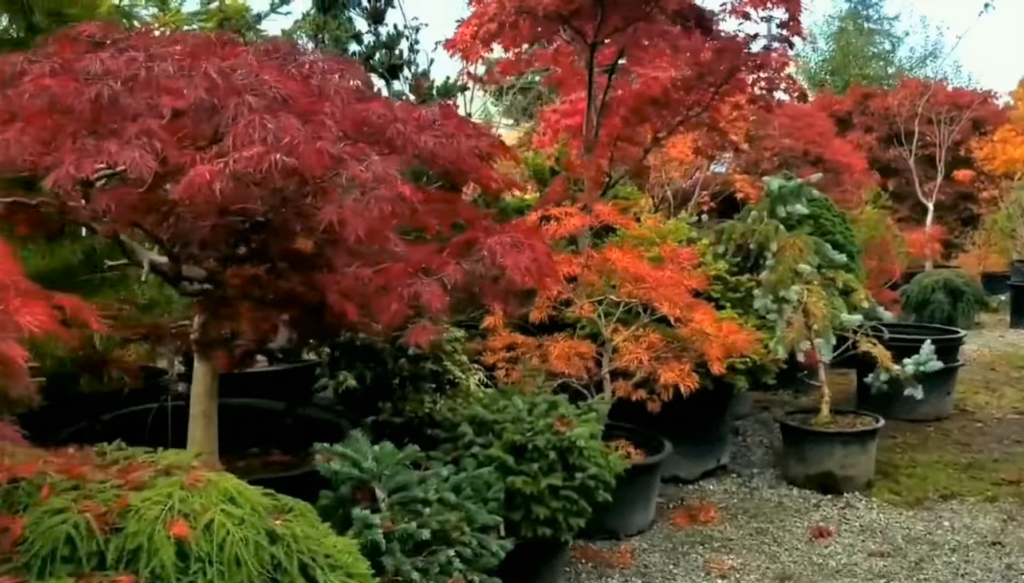
Ground Cover under Maple Tree
One of the most important things to consider when planting a ground cover under a maple tree is the light requirements of the plant. Many ground covers require full sun to partial shade, but there are some that will tolerate shady conditions. Once you have determined how much sun your ground cover will need, you can narrow down your choices.
Another consideration is the soil type. Some ground covers prefer well-drained soils while others do better in moist conditions. Again, this will help you narrow down your choices.
When choosing a ground cover for under your maple tree, make sure to pick one that is compatible with the tree’s root system. The roots of a maple tree can be aggressive and spread outwards, so it’s important to choose a ground cover that won’t be easily displaced by the roots. Creeping phlox and sweet woodruff are two good options that fit these criteria.
Finally, make sure to choose a ground cover that is appropriate for the size of your area. If you have a large area to cover, opt for something like English ivy or pachysandra; if you have a small area, go for something like periwinkle or Vinca minor.
Do Maple Trees Kill Other Plants
Maples are beautiful, stately trees that are a lovely addition to any yard. But did you know that maple trees can actually be harmful to other plants? That’s right – these popular trees can actually kill other plants!
How do maple trees kill other plants? Well, it all has to do with the roots. Maple roots are very aggressive and they spread out wide, often taking over the root systems of other plants nearby.
This can cause problems for both the plant being taken over and the maple tree itself. The other plant may not get enough water or nutrients, leading to its death, while the maple tree may become too big and unwieldy. So what should you do if you have a maple tree in your yard?
First of all, don’t plant anything else too close to it. Give it some room to grow without crowding other plants. Secondly, make sure you give it plenty of water – deep watering is best so that the roots can really soak up all the moisture they need.
By following these simple tips, you can enjoy your maple tree without harming other plants in your yard!
Sugar Maple Companion Plants
If you’re lucky enough to have a sugar maple in your yard, you might be wondering what other plants would make good companions for it. Here are some ideas:
Serviceberry – This shrub is perfect for underplanting a sugar maple, as it has similar growing requirements and provides beautiful spring flowers and edible berries.
Dogwood – Another good understory plant for sugar maple, dogwoods provide lovely spring flowers and bright fall foliage. They also prefer similar growing conditions to maples. ferns – Ferns make great ground cover beneath a sugar maple, helping to keep the soil moist and cool.
They come in many different varieties, so you can choose one that suits your landscape.
Red Maple Tree Companion Plants
The Red Maple tree is a beautiful addition to any yard or garden. But what are the best companion plants for a Red Maple? Here are some of our favorites:
Japanese Blood Grass: This grass is perfect for adding some contrast to the crimson leaves of the Red Maple. It also does well in shady areas, making it a great option for underplanting.
Hosta: Another shade-loving plant, Hostas come in a wide variety of colors and sizes. Their leaves will add texture and interest to your planting bed.
Ferns: Ferns are classic companions for maples, and they come in many different varieties to suit your needs. They prefer moist, shady conditions, so they’re perfect for growing beneath your Red Maple.
Bleeding Heart: If you’re looking for a splash of color, Bleeding Hearts are perfect! Their delicate pink flowers will add brightness to your planting bed from spring through summer.
Perennials to Plant under Maple Tree
When it comes to perennials, most people think of flowers. But there are many other types of plants that can make excellent additions to your garden. One such plant is the maple tree.
Maple trees are a great choice for gardens because they provide shade and shelter from the sun. They also have beautiful leaves that change color in the fall, providing a stunning contrast to the green of summer. While maple trees are typically thought of as large trees, there are actually several varieties that stay relatively small, making them ideal for smaller gardens.
Contrary to popular belief, not all maples produce sap – only those in the Aceraceae family do. So if you’re looking for a Maple tree that won’t make a sticky mess, look for one of these varieties:
- Acer buergeranum (Trident Maple)
- Acer cappadocicum (Cappadocian Maple)
- Acer crataegifolium (Hedge Maple)
- Acer japonicum (Japanese Maple)
- Acer palmatum (Japanese Maple)
- Acer pseudosieboldianum (Korean Maple)
Planting under Large Maple Trees
Although it may seem impossible, planting beneath large maple trees can be done with a little creativity and the right approach. Here are a few tips to get you started:
- Choose shade-tolerant plants that will thrive in the dappled sunlight that filters through the maple tree leaves. Some good options include ferns, hostas, and impatiens.
- Amend the soil in your planting bed to make it more acidic. Maple trees prefer acidic soil, so adding peat moss or composted pine needles will help create an environment more conducive to plant growth.
- Be careful not to damage the maple tree’s roots when digging holes for your plants. The roots of these trees spread wide and flat, so it is important to avoid damaging them when excavating for your new plants. A sharp spade or shovel is key to making clean cuts without harming the roots.
- Water regularly during dry periods to ensure that your plants get enough moisture. Shade-loving plants often require more water than those that grow in full sun, so be sure to keep an eye on them, especially during summer.
Frequently Asked Questions:
What do you put under a small tree?
You can put mulch under a small tree. Mulch helps retain moisture, control weeds, and regulate soil temperature, benefiting the tree’s health. Make sure to create a mulch ring around the tree but avoid piling it against the trunk, as this can lead to moisture and pest issues.
What is the best mulch for a maple tree?
Organic mulch, such as wood chips or shredded bark, is the best choice for mulching a maple tree.
How do you landscape around small trees?
Mulch: Apply mulch around the tree to conserve moisture, suppress weeds, and regulate soil temperature.
Edging: Install edging to define the tree’s planting area and prevent grass and weeds from encroaching.
Planting: Add ornamental plants or ground covers for a visually appealing landscape.
Maintenance: Regularly prune, water, and fertilize to ensure the tree’s health and overall landscape appearance.
What’s Next
The possibilities are endless regarding landscaping ideas under a majestic maple tree. From vibrant ground covers that thrive in the dappled shade to charming garden accents that enhance the tree’s natural beauty, you have the power to transform that once-forgotten patch of ground into a captivating oasis.
Remember, it’s all about finding the perfect balance between functionality and aesthetics. Embrace the unique characteristics of your maple tree, harness its shade and grace, and let your imagination run wild. Experiment with different plant combinations, add cozy seating areas, or even create a whimsical pathway that meanders through the enchanting canopy. The choice is yours!
So, venture forth, dear reader, armed with inspiration and armed with knowledge to make your landscaping dreams come true. Let your maple tree be the centerpiece of a haven that reflects your personality, provides solace, and invites the magic of nature into your daily life.
With a little creativity, a green thumb, and a lot of love for your maple tree, you can turn your outdoor space into a sanctuary that leaves you and your guests in awe. Now go forth and let the beauty of your landscaping endeavors blossom beneath the gentle embrace of your magnificent maple tree!



 Editor Chief
Editor Chief